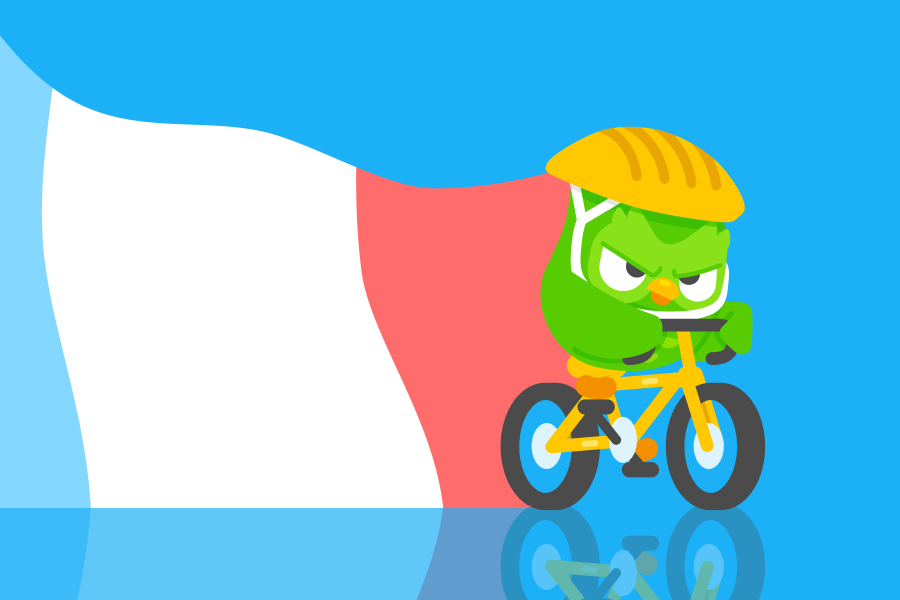This month is the Tour de France, and Duolingo is celebrating with our own "Tour de French Learning"! We'll be exploring topics related to French, its speakers, and the people studying it around the world. Ready to learn more? Allez ! Allez ! Allez !

Bienvenue, dear learner, to our Tour de French Learning! This month we'll be leading you through the hills, curves, and exciting terrain of le français, the language of physicist Marie Curie, performer Josephine Baker, writers Victor Hugo and Alexandre Dumas, actor Marion Cotillard, and comedian Gad Elmaleh. French is the fifth most widely spoken language in the world, with over 274 million people using it as a first or second language. It's the official or co-official language in 29 countries on five continents, and it's one of the official languages of the United Nations and the European Union.
French also has a special place in our hearts at Duolingo: There are almost 29 million active learners across our 10 French courses! Here’s a taste of how popular it is around the world:
- French is the most popular language to study in 24 countries, including Australia, Canada, Uganda, Sri Lanka, and Monaco.
- French ranks #2 in an additional 66 countries, including the U.K., Panama, Mexico, and Egypt.
- The most popular French courses on Duolingo are for English speakers (17.9 million learners), Spanish speakers (4.26 million learners), and Arabic speakers (1.85 million learners).
A brief Tour de French
Maybe you’re new to the language, or maybe you’re looking to add another course to the mix. Either way: French is a great language to study! Here are a few things every learner should know:
- French is a Romance language, which means it evolved from the dialects of Latin that were spoken in modern-day France. It's closely related to Italian and Spanish, and more distantly related to English and German (among many, many others!).
- French and English share a lot of vocabulary, so even if you've never studied French before, some of it will look familiar! That's because, long ago, French speakers invaded southern England and brought their language with them.
- French has formal and informal versions of pronouns and verb endings. For example, tu is the way you say "you" to a person you know well or to a child, while vous is a formal version of "you" that sounds more polite, for people you need to show respect to or when talking to strangers.
- French nouns are either masculine or feminine. French has grammatical gender, which means even words that have nothing to do with people are all either masculine or feminine. That can be surprising for English speakers, but there are lots of patterns to look for!
- French vowels use your lips and nose in new ways. If you're an English speaker, you'll learn new ways to pronounce vowels! For a lot of French vowels, you'll round your lips, like in a kissy face, like we do for "oo" in the English word "moo." Some French vowels are also nasal—you breathe through your nose when pronouncing them!
- French adjectives go after the noun, in most cases. In English, we say "the blue house," but in French you'll say "the house blue" (la maison bleue).
- French is known for its silent letters, but its writing system really just follows a set of rules! French often uses several written letters to represent just one sound (l'eau, "water," is pronounced "lo"!). That might be some extra writing, but memorizing the letter combinations is so worth it.
- French verbs change their endings, even if they're silent. In French, you change the ending of the verb to show who is doing the action, sort of like how in English we say "I eat" but "she eats." But in French this is mostly a rule for writing—the letters are often silent!
How to learn French
French is a great language for new learners to study, especially if you already know English. There are enough words that will look familiar that you can focus on learning the interesting differences. It's also easy to find opportunities to practice French, since it's used widely online and in social media by people around the world, and there might even be speakers in your own community to connect with!
Here are some ways you can join the peloton of Francophones and start learning French:
- Study with Duolingo's French course. It's totally free, and the app uses gamification to keep you motivated and study a little bit each day. The French course for English speakers also has a lot of features to get you using the language in new, interactive ways: there are silly and surprising short Stories, immediate feedback and helpful tips, immersive exercises, and special lessons focusing on conversation skills.
- Create a playlist with songs in French. Tune your ear to your new language by listening to French music! You can explore new artists and genres including Mika, Stromae, Gims (Maître Gims), Emma Peters, Jul, Angèle, and Corneille.
- Follow French accounts and content creators. Find accounts and creators that post in French on the social media platforms you hang out on anyway. Look for accounts about the topics you already care about; that way, you'll start learning relevant vocabulary and lots of culture, too! You might like @michelle1furtado on TikTok and Cyprien on YouTube.
- Study with learners worldwide. Connecting with other French students is a great way to stay motivated and get practice at your level! You can find communities of learners online, and check out Duolingo Classes for fun language exchanges with French-speaking hosts.
- Make the most of your favorite streaming service. Yes—watching TV counts as studying! With series like Lupin, Call My Agent, Le Bureau des Légendes, and Au service de la France (A very Secret Service) you can practice French from your couch. As you get more comfortable with the language, try switching the English subtitles to French!
- Learn about culture through books and podcasts. For intermediate and advanced learners, find French versions of what you love! If you're a foodie, look for books or blogs in French about French cuisine (and try recipes in French, too!). If you're a history buff, read about the history of the French diaspora around the world. And don't forget to check out French-language podcasts, too—Duolingo has a great one for learners, and you'll learn about French traditions, cultures, and speakers around the world!
This month, let Duolingo be your domestique (that's a "support rider") to get you pumped up about French. Check back for the next stage in our Tour de French Learning!
